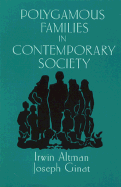Book contents
- Frontmatter
- Contents
- Foreword
- Preface and acknowledgments
- 1 Introduction
- Historical background
- Early stages of relationships
- Home environments of plural families
- Managing everyday life
- Social-emotional and family relationships
- Appendix A Methodology and procedure
- Appendix B Demographics of Mormon polygyny
- Notes
- References
- Index
Foreword
Published online by Cambridge University Press: 05 May 2010
- Frontmatter
- Contents
- Foreword
- Preface and acknowledgments
- 1 Introduction
- Historical background
- Early stages of relationships
- Home environments of plural families
- Managing everyday life
- Social-emotional and family relationships
- Appendix A Methodology and procedure
- Appendix B Demographics of Mormon polygyny
- Notes
- References
- Index
Summary
This volume is the work of research scientists of uncommon talents and experience. Irwin Altman, the senior author, is a social-environmental psychologist of international reputation, the author and editor of numerous books and specialized research papers, and the recipient of many scholarly honors. Joseph Ginat, an anthropologist, has published extensively and is well known for his work on Israeli-Arab family, political, and cultural relations. Together they have produced a remarkable volume of research that is at once objective and sympathetic. They have achieved an understanding of their subject while observing it from the outside and at the same time experiencing it almost intimately from the inside. The degree of confidence and trust established with the men and women whom they studied – at times yielding surprising disclosures – is a testament to the honesty and integrity of the authors as well as the humanity of their participants.
Much that has been written about Mormonism and the Mormon people has been seriously flawed by the bias of its authors. If not apologetic or propagandistic, it has been pejorative or judgmental. For more than a century from the Mormon beginnings in the 1830s, attempts to treat the Mormons, their history, beliefs, and practices, dispassionately and without prejudice were few and far between. This was especially true of Mormon polygamy, which was practiced secretly in the early years but flourished openly after 1852 until its official church prohibition in 1890 and 1904.
- Type
- Chapter
- Information
- Polygamous Families in Contemporary Society , pp. vii - viiiPublisher: Cambridge University PressPrint publication year: 1996



